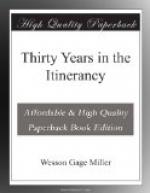The Wisconsin Phalanx came from the southeastern portion of the Territory and settled at this point in May, 1844.
Soon after their settlement, Rev. Wm. H. Sampson, Presiding Elder of Green Bay District, visited the place and held the first religious service of which I can obtain information. Not long after the minister in charge of the Winnebago Lake Mission at Oshkosh visited Ceresco, and formed a class of seven members. The names, as far as ascertained, were Rev. Uriel Farmin and wife, Mrs. Morris Farmin, Mrs. Beckwith and George Limbert. The first named was appointed Leader.
The Association had erected two long buildings, one for a tenement house and the other for a dining hall. The first was built with a wide hall running from one end to the other. On either side of this hall suits of rooms had been provided for the accommodation of the several families, giving to each family at least a parlor and one or more sleeping apartments, according to its needs. Here families were as exclusive in their relations as good neighborhood could well require. The dining hall was a long, narrow building, giving in its width, barely room enough for the table, a row of persons on each side, and the free movement of the waiters behind them. The tables would accommodate one hundred and fifty at a fitting. In the rear of the dining hall, there was a large kitchen in which the cooking was done for the entire Association. The service of the kitchen, as well as every other department, was performed by persons who either volunteered or were assigned to their positions by lot, and were paid by the hour from the common fund. Divided into squads, each section had a foreman or directress, elected at reasonable intervals. It was expected that all the members would take their meals at the common table, yet exceptions were allowed in certain cases. It was affirmed that with this division of labor and a common table, the cost of board for a single individual per week did not exceed fifty cents.
The Association had under cultivation several hundred acres of land and were now putting flour mills in operation. Goods were purchased at wholesale by the Association and re-sold to individuals at the same rate. A school had been established and was under the care of a very competent teacher. Thus, externally, everything appeared to promise well and the people seemed orderly and happy. But, like all other enterprises of the same character, selfishness and corruption finally crept in, and the institution fell into decay, and ultimately disappeared.
The people of Ceresco were always gratified to receive the attention of the outside world, and their hospitalities were proverbial. And, though not a few of the leading men were professed Infidels, they always received ministers gladly and treated them with consideration. They were specially gratified to have religious services held among them, and the ringing of the bell would generally insure a good audience. The dining hall was used as a Chapel until a more convenient place was provided in the erection of a large school house.




